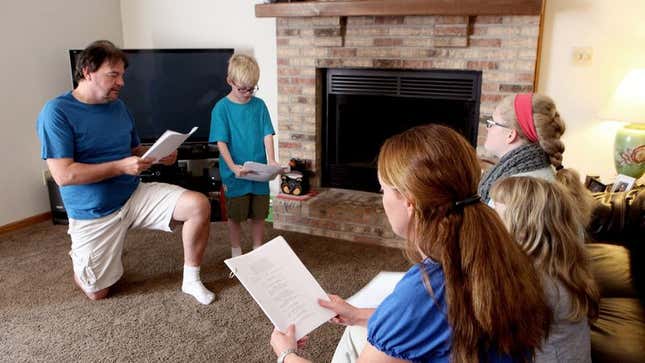
LOS ANGELES—Noting that ticket sales nationwide have fallen to a 20-year low, a study published Friday by the Motion Picture Association of America found that movie theater attendance continues to decline as more Americans choose to act out films at home.
According to the study, rising ticket prices across the country, combined with the greater convenience of staying in, have contributed to the popularity of performing full-length feature films in the comfort of individuals’ own living rooms.
“Whereas previous generations of moviegoers would look forward to new movie releases and head to their local theater on a Friday or Saturday night, today’s entertainment consumers are increasingly choosing to print out screenplays, cast friends and family in the various roles, and act out films without ever leaving their houses or apartments,” said MPAA analyst Tate Mitchell, citing the fact that in 2015, more than 80 million households acted out summer blockbusters on their opening weekends, including Jurassic World and Mission: Impossible—Rogue Nation, rather than viewing them on the big screen, a 14 percent increase over the previous year. “Savings aside, this option also provides people with a much greater variety of movies to act out, from the latest big-budget action-adventure films, dramas, and romantic comedies to Hollywood classics, documentaries, and foreign films.”
“When people are faced with choosing one of a limited number of fixed showtimes, driving to and from the theater, and finding seats together among scores of strangers, it’s easy to see why staying home and performing a film or even two makes more sense,” he continued.
In a survey conducted by entertainment industry analytics firm Rentrak, moviegoers cited cost as the main reason for avoiding the theater, noting that the price for a family of four attending the Pixar hit Inside Out in theaters could reach $50, compared with the $12.95 it would cost to run off four copies of the script at a nearby print and copy center. Taking 20 children to the same movie for a birthday party would cost as much as $200, excluding soda and snacks, compared to the much lower cost of letting the children act it out in a parent’s basement or rec room.
Additionally, 72 percent of respondents said they enjoyed the flexibility of home-acting versus watching movies in the theater, noting that if one of them needed to use the restroom or get more popcorn during a pivotal scene, the actors could pause the performance and do another take when the person got back. Nearly two-thirds of those polled also cited a lack of advertisements before performances as a benefit, as moviegoers were able to jump right into the film without performing any trailers, or only act out the trailers they were most excited about.
“The first Avengers film made billions of dollars worldwide, but when the sequel came out, people said, ‘You know what, instead of waiting in line for this, let’s just act it out at home or go over to the neighbors’ and see them perform it.’”
Parents in particular said they enjoyed knowing that, unlike seeing a new movie in theaters, performing films at home allowed them to make edits and script notes to protect their children from gratuitously violent or sexual material.
“Last weekend, the whole family decided to act out The Master, so my husband and I made sure to remove all the inappropriate stuff from the script before we started,” said 38-year-old Cincinnati-area mother Janice Dewins, who played the roles of Lancaster Dodd’s wife, Peggy, the salesgirl Martha, and several other supporting characters. “My 8-year-old son was Freddie Quell, who gets hooked on a mix of alcohol and gasoline, but we just had him drink orange juice instead. It was nice to be able to stop the performance at any time to explain to him what was going on or to comfort him whenever anything he was acting out got too scary.”
“We obviously cut that whole explicit scene where Peggy pleasures Lancaster in the bathroom,” Dewins added.
Other moviegoers went on to say they particularly appreciated being able to prepare their own concessions at home instead of paying exorbitant theater prices. Rather than shell out $12 to $14 for a bucket of popcorn, many families said they make their own in the microwave, while others explained how they pour three cans of soda into a large cup to create their own 36-ounce beverage.
Many industry insiders have taken notice of the trend, and admitted that as Americans put on millions of productions of movies every year—performances that are becoming much more nuanced, layered, and compelling as consumers hone their craft —the traditional model of film distribution may soon become entirely obsolete.
“The first Avengers film made billions of dollars worldwide, but when the sequel came out, people said, ‘You know what, instead of waiting in line for this, let’s just act it out at home or go over to the neighbors’ and see them perform it,’” said Walt Disney Studios spokesperson Eric Rudolph, who admitted that he and his wife recently decided not to see Straight Outta Compton in theaters, with both agreeing they would just wait until the script showed up on the internet and then act it out at a later date. “The fact of the matter is, the industry is going to have to pivot to accommodate the new reality of people who just want to wind down after a long day by going into their room, shutting the door, and acting out a film alone—particularly if other family members or roommates are acting out another movie in the living area.”
Rudolph added that the advent of smartphones has also drastically changed filmgoers’ habits, as it is now easier than ever for people to load scripts onto their devices, act out 15 minutes of a movie on their commute to work, and pick it back up at the next scene on their way home.